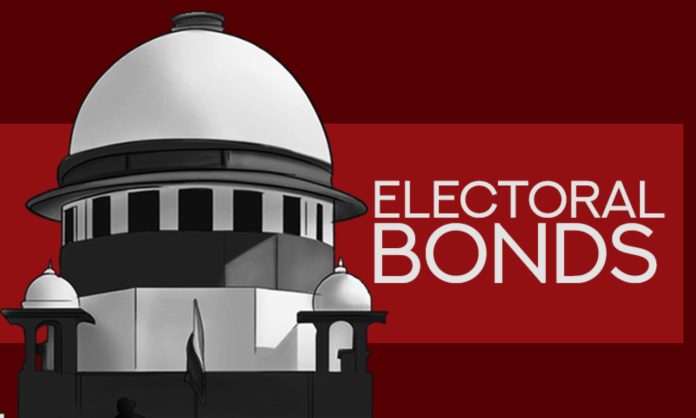NEW DELHI, Oct 16: The pleas challenging the validity of the electoral bond scheme for political funding of parties will now be adjudicated upon by a five-judge constitution bench for an authoritative pronouncement, the Supreme Court said today.
The Electoral bond scheme, which was notified by the government on January 2, 2018, was pitched as an alternative to cash donations made to political parties as part of efforts to bring in transparency in political funding.
According to the provisions of the scheme, electoral bonds may be purchased by a person who is a citizen of India or entity incorporated or established in India. An individual can buy electoral bonds, either singly or jointly with other individuals.
A bench headed by Chief Justice D Y Chandrachud, which had said that as many as four PILs on the issue will be accorded final hearing on October 31 and November 1 by a three-judge bench, Monday observed that now they will be decided by a five-judge bench on the dates fixed earlier.
“In view of the importance of the issue raised, and with regard to Article 145(4) (relating to rules for regulating procedure of SC) of the Constitution of India, the matter be placed before a bench of at least five judges…,” the court said.
The bench, also comprising justices J B Pardiwala and Manoj Misra, said it has received an application that the matter being urgent be sent to a larger bench for a conclusive judgement.
On October 10, the top court had taken note of the submissions of lawyer Prashant Bhushan, appearing for NGO ‘Association for Democratic Reforms’ (ADR), that the matter needed adjudication before the electoral bond scheme opens for the 2024 general elections.
The anonymous funding through electoral bonds encourages corruption and violates the citizens’ right to have a corruption-free nation, Bhushan had said.
“This promotes corruption as the source of funding is anonymous. It is violative of Article 21 and the ‘non-decision’ in the case is compounding the problem,” he had submitted.
The bench had said it will commence the hearing on October 31 and finish it by November 1 if the hearing spills over.
“If any further written submissions are required to be filed, they shall be filed by 5 PM on 27 October 2023. Soft copies shall be compiled by the nodal counsel previously appointed and be emailed at …,” the bench had said while issuing procedural directions.
In the meantime, the nodal counsel shall put together a common compilation of the submissions, pleadings, documents and precedents in terms of the apex court circular, it had said.
There are four PILs pending on the issue. One of the PIL petitioners had said in March that so far Rs 12,000 crore has been paid to political parties through electoral bonds and two-thirds of the amount has gone to one major political party.
The top court had on March 21 said it will consider whether the pleas can be referred to a constitution bench for an “authoritative pronouncement”.
Lawyer Shadan Farasat, appearing for one of the PIL petitioners, had said the pleas be referred to a constitution bench due to the impact of the electoral bond scheme on the democratic polity and funding of political parties.
The bench has appointed two lawyers including Neha Rathi as nodal counsel for ensuring smooth hearing of the PILs, saying they would coordinate and ensure the common compilation of judgements and other records are filed.
Lawyer Bhushan has been seeking urgent listing of the PIL by the apex court and a direction to the Centre to not open any further window for the sale of electoral bonds during the pendency of a case pertaining to the funding of political parties and alleged lack of transparency in their bank accounts.
The NGO, ADR, which filed the first PIL on the issue of alleged corruption and subversion of democracy through illicit and foreign funding of political parties and lack of transparency in the bank accounts of all political parties, had moved an interim application in March 2021 before the assembly polls in West Bengal and Assam seeking that the sale of electoral bonds not be reopened.
On January 20, 2020, the apex court had refused to grant interim stay on the 2018 Electoral Bonds Scheme and sought responses of the Centre and the Election Commission to an interim application by the NGO seeking a stay on the scheme.
Only political parties registered under Section 29A of the Representation of the People Act, 1951 and which secured not less than one per cent of votes polled in the last general election to Lok Sabha or the legislative assembly of the state are eligible to receive electoral bonds.
According to the notification, electoral bonds shall be encashed by an eligible political party only through an account with an authorised bank.
The apex court had in April 2019 also declined to stay the Electoral Bond Scheme and made it clear that it will accord an in-depth hearing on the pleas as the Centre and the EC have raised “weighty issues” having “tremendous bearing on the sanctity of the electoral process in the country”.
The Centre and the EC had earlier taken contrary stands in the court over political funding, with the government wanting to maintain anonymity of the donors and the poll panel batting for revealing their names for the sake of transparency. (Agencies)
Home Latest News SC Refers To 5-Judge Bench Pleas Challenging Electoral Bond Scheme For Political...


